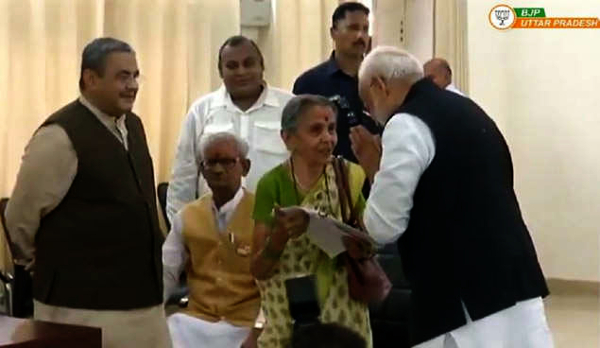‘Mother’s milk is best for your baby’ is mandatory advice on all baby food supplements and formula milk these days. And moms around the world have Annapurna Shukla to thank for this.
It was her ground-breaking research on the importance of mother’s milk that prompted baby food companies in the UK to first start carrying this message. Now most companies in the world do it.
The 91-year-old doctor from Varanasi was recently in the news as one of the four proposers of PM Narendra Modi from the constituency. “Modiji touched my feet and I told him oonche shikhar par jaaoge (you will reach the pinnacle),” Dr Shukla shared with TOI.
But few would be familiar with her contributions to infant health. The World Health Organisation now mandates that infants be exclusively breastfed for the first six months for optimal growth and health. But in 1969-72, when Dr Shukla did her research in the UK and published it in the British Medical Journal, it was hardly a known fact in the West.
Her study, part of her PhD on infant nutrition, was carried out in Dudley, Worcestershire along with three more professors — H A Forsyth, Charlotte M Anderson and SM Marwah. Researchers studied parameters such as body weight, calorie intake, feeding pattern in infants and their correlation with obesity.
“We found that babies up to one year of age, who were getting solid foods and not breast milk, were obese and overweight. When the research was published, the government ordered baby food manufacturers to carry a warning that they were ‘not a substitute for mother’s milk’ on their products. It upset a lot of companies. And today, we are saving babies because of this knowledge,” says Dr Shukla.
Her research, says Dr Shukla, was based on the vedic practice of anna prashan that introduces solids – usually in the form of milk-and-rice kheer – to a child at six months. Until then, the infant is only given mother’s milk.
Pandit Madan Mohan Malviya, the founder of Banaras Hindu University (BHU) was an early influence on Dr Shukla. “I was only five when Mahamanaji, as we called Malviya sahib, asked me what I wanted to do in my life. I said I wanted to be a doctor. Those days, families wouldn’t educate their womenfolk. My mother was the daughter of a deputy collector but she used to fetch water from the well on her head,” says Dr Shukla. Her parents, she adds, instilled a sense of community work in her from an early age.
Although BHU today has a popular medical college, it didn’t offer any courses in medicine in those days. She had to travel to Patna in 1945 to study MBBS at Prince of Wales Medical College (now Patna Medical College and Hospital). “Mahamana ji had told me that once I become a doctor, I should come back to BHU and he will give me a job,” says Dr Shukla.
After completing MBBS, she got married and started working as a medical officer at Mahila Mahavidyalay. She was one of the four practising women doctors in Varanasi at the time. She also took up the assignment of lecturer of home science at BHU on the request of Govind Malviya, Pandit Malviya’s son as the university didn’t have a medical college. “I nurtured a food science and nutrition department at BHU to enable young women to undertake valuable research” says Dr Shukla, who travelled to the UK in 1969 to do her PhD in infant nutrition.
She comes from a family of academics and litterateurs. Her father worked as a spokesperson at BHU and was a close aide of Pandit Malviya; her husband B M Shukla retired as vice-chancellor of Gorakhpur University and author Amish is her nephew. Amish says, “Buaji is an amazing woman. Traditional, polite, warm and yet strong as the Rock of Gibraltar. She truly is the matriarch.”
Source:ToI
Image Courtesy: ToI
You may also like
-
New Heat-Based Approach To Cancer Treatment Can Reduce Chemotherapy Doses
-
Scientists Take A Major Step Towards Unification Of Classical & Quantum Gravity
-
India Graphene Engineering and Innovation Centre (IGEIC) Under the Vision of Viksit Bharat@2047 Launched
-
New High-Performance Gas Sensor can Monitor Low Level Nitrogen Oxides Pollution
-
Antidepressant Drug can be Repurposed for Treating Breast Cancer
